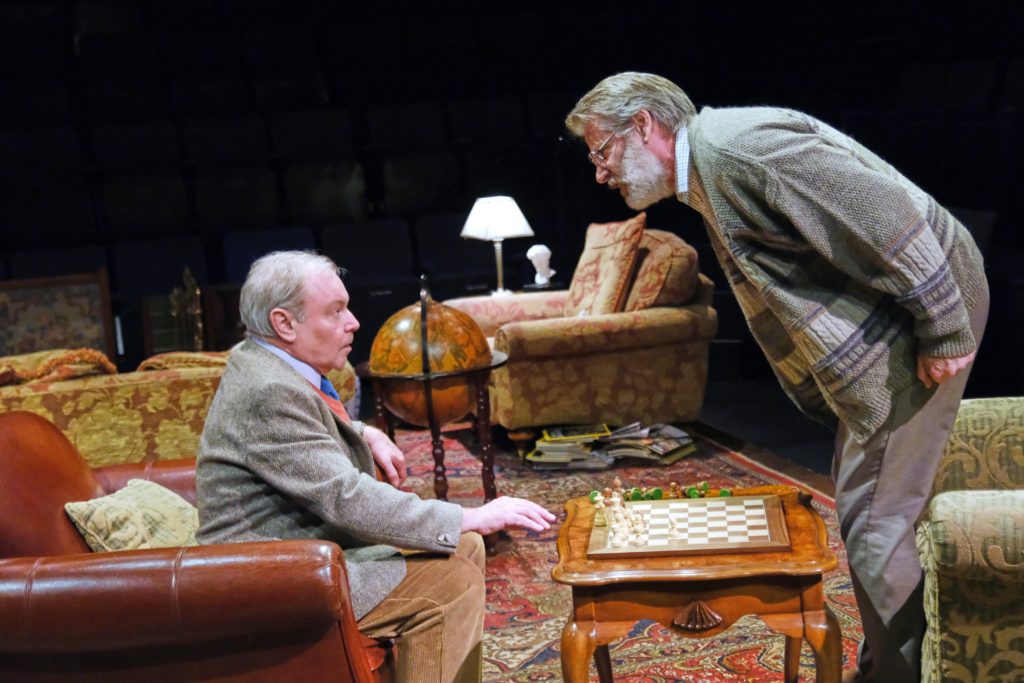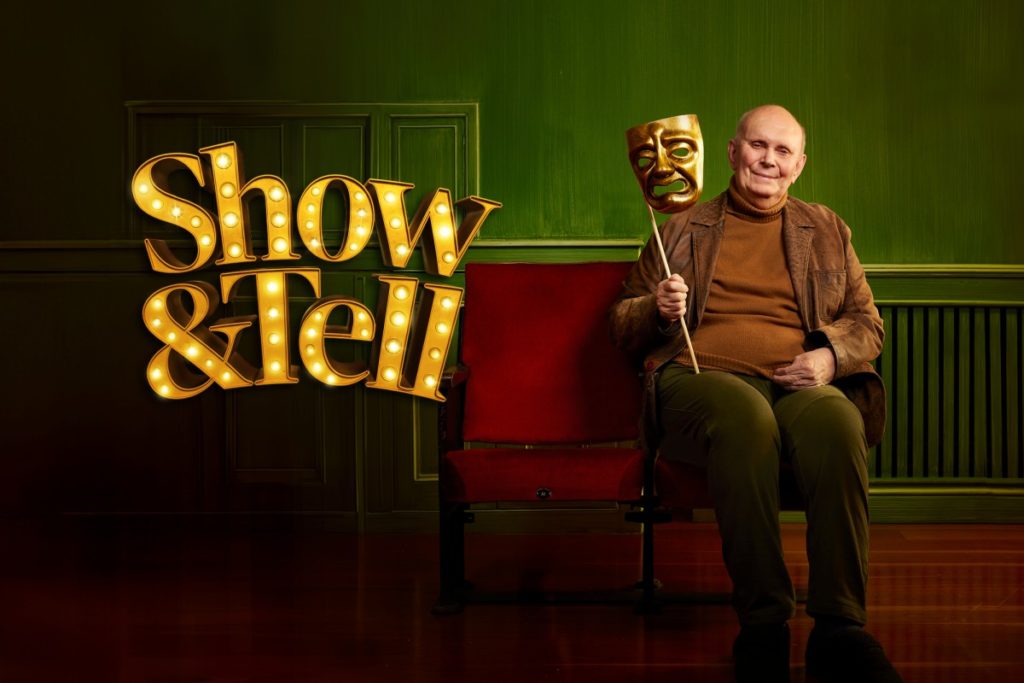
A Winter Adventure: Receiving a frosty reception, but in a good way at JORVIK Viking Centre
SNOW outside, and now snow inside too, as Norse god Skadi brings snow and ice to AD960 Coppergate at the JORVIK Viking Centre, where sub-zero temperatures are forecast to take up residence until February 22 2026, the official end of the Viking winter.
A Winter Adventure brings a new wintery experience to the underground York visitor attraction, where the 10th century Vikings are preparing to celebrate Yule with natural decorations hung on their houses, mirroring modern York’s preparations for the festive season.
JORVIK Viking Centre is run by York Archaeology, whose director of public engagement, Gareth Henry, has directed this year’s displays and technological innovations.
“We changed the season inside JORVIK for the very first time last winter, and the public’s reception was amazing. Everyone loved seeing the 10th century inhabitants of Viking-age York coping with a cold winter, so we’ve brought it back for this winter season – and added more changes too” says Gareth.
“This year, our Ljósálfar – Norse elves – have a few more tricks up their sleeves to make the whole JORVIK experience even more immersive as we introduce a brand-new ‘wow’ to the experience.
“For the first time ever, visitors will be able to peer through a time portal, into the blacksmith’s house that we excavated on this site in the 1970s, seeing what it would have been like to live there, even before they get on board a time sleigh to travel back in time for themselves.”

Festive chat at A Winter Wonderland at JORVIK Viking Centre
York company Bright White’s new interactive Time Portal now opens the visit to JORVIK, once visitors have descended to stand at 10th century street level. This introductory show, using the most up-to-date time vortex technology, provides a window to the city populated by Nordic settlers 1,000 years earlier.
The portal takes visitors to the Viking-age dwelling on display under the glass floor beneath their feet when it was still the home and workshop of a 10th century blacksmith.
Visitors then alight a Time Sleigh for a tour around the backstreets, transformed into a winter wonderland by Wetherby set dressers EPH Creative, who have covered streets and houses in a thick blanket of snow. Cold blue lighting adds an extra frisson of excitement, as mist rolls in off the river and onto the quayside.
The Viking-age residents are wearing their extra-warm woollen cloaks and knitted hats, while the produce on the market stalls on Coppergate now offers winter fare for the residents’ stew pots.
“Once off the ride, visitors can warm themselves by the fare in our storytelling Skald’s house, to hear about how the hardy Vikings survived in the winter months, and hear sagas and tales of Yuletides past,” says Gareth.
In the cutting-edge upgrade to JORVIK’s existing time travelling technology, “time engineers” Bright White have worked with the JORVIK team since March to create the virtual world to be seen behind the interactive temporal portal, making the buildings and interiors of Viking-age Coppergate as authentic as possible.
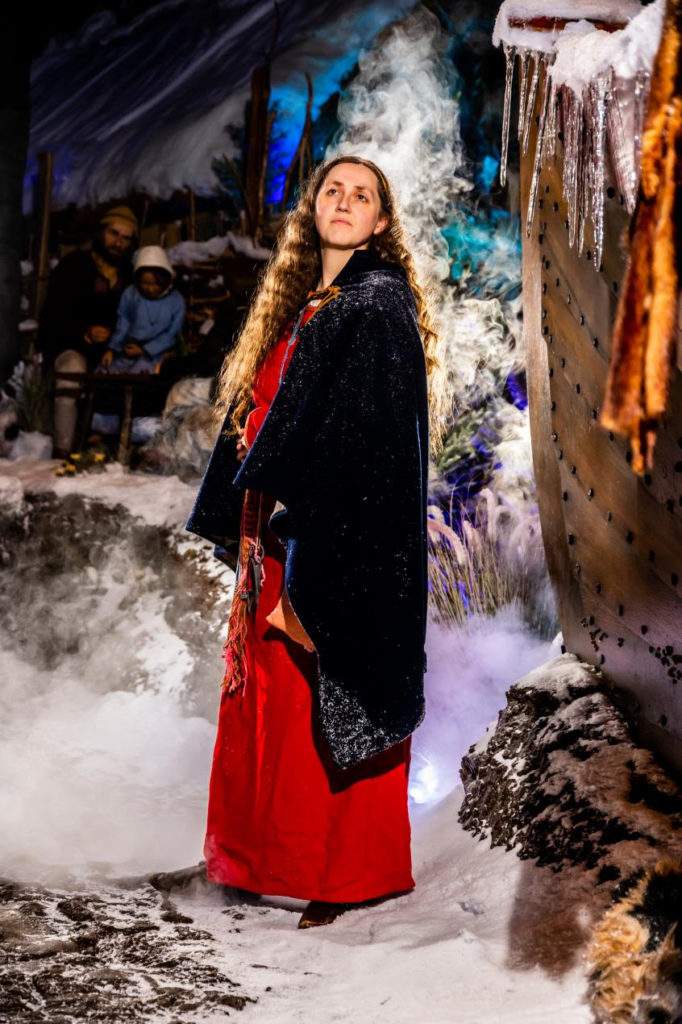
No end to winter conditions at JORVIK Viking Centre until February 22
Research and development was conducted in the R&D lab at the Guildhall, in tandem with York company XR Stories, inviting schools and families to give feedback, complemented by the training of the JORVIK actors by Gordon Meredith that enables each live interpreter to bring their own interpretation to the Skald storytelling.
“Everything you hear and see at the Time Portal comes through our collaboration with the JORVIK Viking Centre team and York Archaeology,” says Bright White founding director Chris Walker.
“This is the first time we have worked with the trust [York Archaeology], but we have created other very popular attractions, such as Yorkshire’s Jurassic World at the Yorkshire Museum, which also uses XR [Extended Reality], combining Virtual Reality and Augmented Reality.”
Pre-booking is essential for all visits to JORVIK at jorvikvikingcentre.co.uk. Tickets cost £17.50 for adults, £14, students, £12, children or £49 for a family ticket (two adults and two children) or £56 (two adults and three children), with under–fives admitted free of charge.
Tickets are valid for unlimited repeat visits for a whole year, enabling visitors to enjoy A Winter Adventure as well as a more conventional visit when the JORVIK snow melts away in late-February.
“This is a brilliant add-on for anyone visiting York for the Christmas markets, providing a winter wonderland experience to boost the Christmas spirit – and, of course, we also have a great range of wines and spirits, as well as unusual jewellery and drinking horns, that make perfect gifts,” says York Archaeology head of operations, Mark Jackson. “It’s also a brilliant option for children celebrating birthdays – a great treat for them and a group of friends.”

Keep an eye on what will be happening at JORVIK Viking Festival 2026
As ever, the 2026 Jorvik Viking Festival will mark the traditional end of winter, running from February 16 to 22 in the latest Viking invasion 1160 years after they first arrived.
For seven days, Norse influence will be spread across the city centre as Viking enthusiasts from around the country and beyond descend on York for Europe’s largest Viking Festival. Around 500 Viking re-enactors are expected to help welcome as many as 50,000 residents and visitors for living history, crafts and combat within the city walls.
“Funded by York Archaeology, JORVIK Viking Festival has become one of the anchor events in York’s tourism calendar, bringing in the crowds during what would previously have been a very quiet time for the city,” says Mark Jackson.
“We will be celebrating the end of winter with our traditional blend of February feasting and fighting – and invite everyone to come along to join us.”
Mark continues: “We know that there is always high demand when we release tickets, especially for events like the Feast, which make brilliant Christmas presents, so we’ll be releasing tickets for different events at different times over the coming weeks.
“Of course, there are a host of events at the heart of the festival – including a large Viking encampment in Parliament Street and the traditional March to Coppergate – which are entirely free to attend with no tickets required. But be sure to mark the date in your diary!”
For more details of JORVIK Viking Festival 2026, visit jorvikvikingfestival.co.uk. Please note, A Winter Wonderland was sold out for the 2025 festival week, so festival visitors are advised to book early for A Winter Adventure to avoid disappointment.
For more details of JORVIK Viking Festival 2026, please visit jorvikvikingfestival.co.uk.
Did you know?
COPPERGATE takes its name from being the Viking street of cup makers.

Green Father Christmas on the Victorian street of Kirkgate at York Castle Museum. Picture: History Riot
In Focus: A Very Yorkshire Christmas at York Castle Museum, York, until January 4
YORK Castle Museum is brimful of festivity after opening its festive season, A Very Yorkshire Christmas, on November 15 with an invitation to “embrace the .
Inspired by Yorkshire Christmases through the ages, this year the museum celebrates Christmas from the 17th century to the 1980s, with period decorations and a packed programme of live performances, music and cookery demonstrations in the Castle Kitchen for all to enjoy.
Snowy scenes and festive delights await on Kirkgate, the famous Victorian street now lined with sweet-scented fir trees. Take a photo in the Kirkgate sleigh and take home a memory of 19th century Christmas.
Experience a Victorian Christmas with authentic decorations and live performances of traditional carols every Monday. Browse the shop windows to find a range of Victorian Christmas objects from the York Castle Museum collection. Play Victorian parlour games, such as the Grandmother’s Trunk memory game.
Beautifully decorated trees and twinkling garlands accompany the layer of snow on the cobblestones, transporting visitors to a Christmas reminiscent of Dickensian England.

The poster for A Very Yorkshire Christmas at York Castle Museum
Championing the ancient winter festival of the “Riding of the Yules” and carrying a leg of lamb spiced with rosemary, a tambourine and a bell, Green Father Christmas will be wandering the street on Saturdays, Wednesdays and Thursdays until Christmas Ever, topped up with an additional appearance on Tuesday, December 23.
Green Father Christmas will be delighting visitors with Victorian games, songs and tales of winter feasts and traditions, climaxing with the Dance of Spring.
“I’ve been through plenty of names,” says Green Father Christmas. “I started out as Nicholas, Bishop Nicholas in the 4th century, Saint Nicholas, Sir Christmas, now Father Christmas. In 1616, Ben Jonson called me Old Christmas. I consider the Ghost of Christmas Present in Charles Dickens’ A Christmas Carol to be me!”
The Ran Tanners and Paul the Historical Musician return for the much-loved Sunday Sounds. Throughout November and December, Sundays feature festive tunes played on traditional instruments throughout the museum.
Peer into the period rooms to see how some homes in the 17th and 18th centuries were decorated for Christmas. You might see familiar seasonal favourites in the 1940s’ and 1980s’ kitchens.
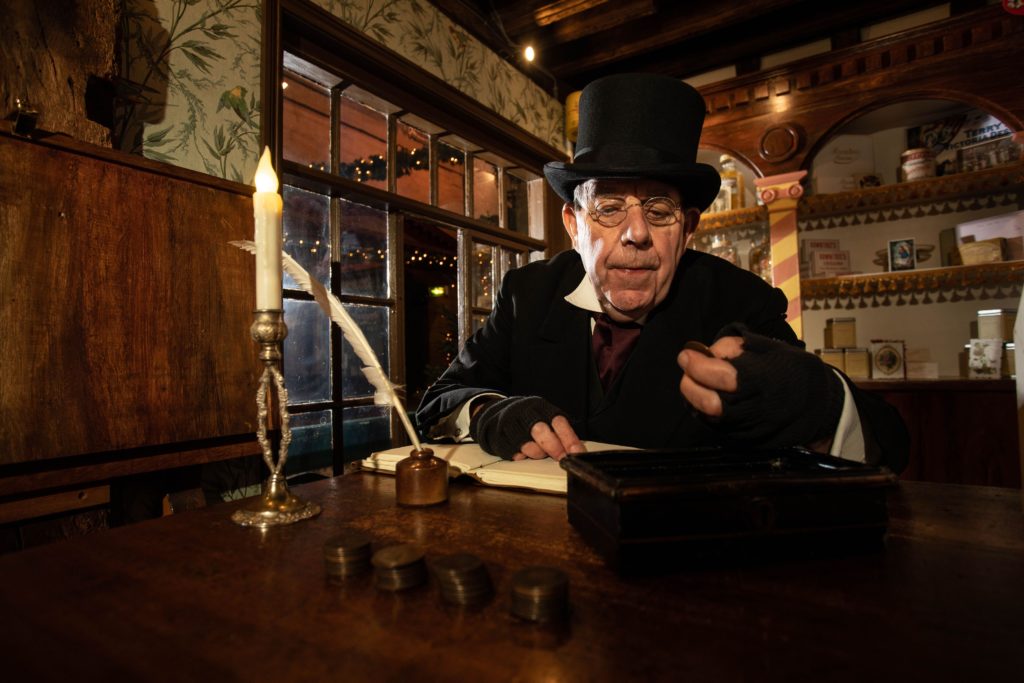
Chris Cade’s Scrooge on Kirkgate. Picture: Duncan Lomax, Ravage Productions

Storycraft Theatre’s Jane Bruce, left, and Cassie Vallance: Performing interactive stories of Ralf the Robin at York Castle Museum
Visit the Castle Kitchen on Thursdays and Saturdays until December 20 for live baking demonstrations of historic Tudor and Georgian mince pie recipes, the former made with meat, mace and cloves, the latter with almonds, rosewater, apple, prunes and currants. There will often be samples to try and recipe cards to take home.
The Sixties Street features festive decor, most notably tinsel trees, toys and Christmas songs straight from the 1960s.
In Kirkgate, Chris Cade’s Scrooge returns for one-man performances of A Christmas Carol, running on Fridays from today to December 12. His much-loved nighttime performance, An Evening With Ebenezer Scrooge, returns on Wednesday, December 10, with mulled wine and mince pies, complemented by musical accompaniment from the Ran Tanners.
In a new event for 2025, Ghost Stories for Christmas, by Edwrydian Tales, takes place on Sunday, December 14 at 7pm. This event takes visitors back to traditional practices of passing long winter nights in front of the fire sharing stories of the supernatural.
A range of activities will be taking place throughout the winter, for adults and children alike. Storycraft Theatre’s Cassie Vallance and Jane Bruce will be at the museum on Tuesdays to present interactive stories featuring Ralf the Robin and his puppet friends.
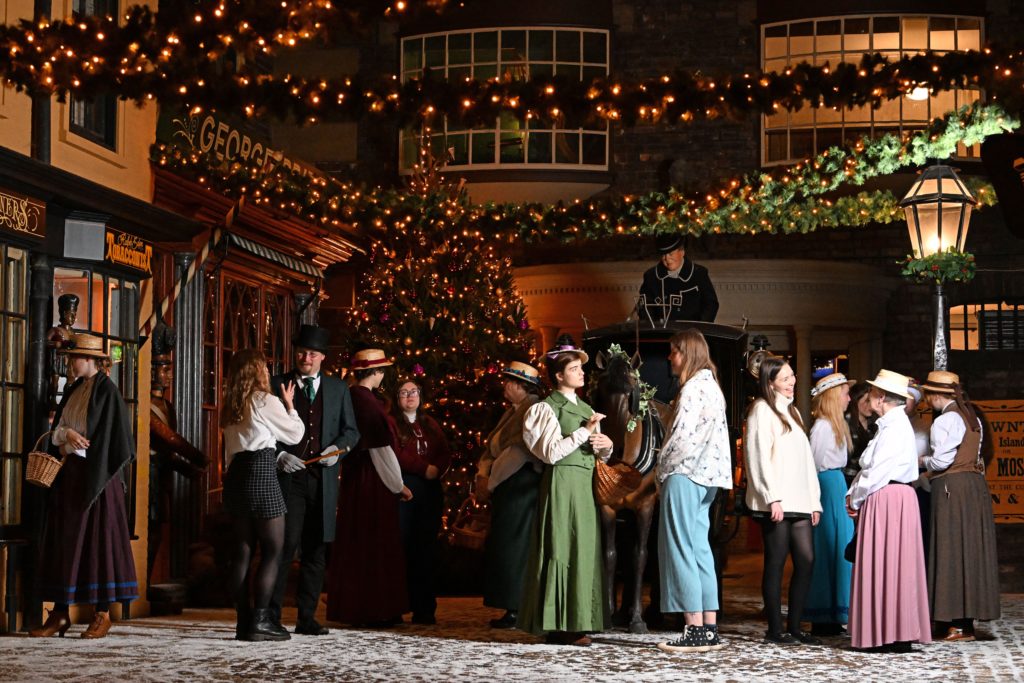
Christmas on Kirkgate at York Castle Museum. Picture: Anthony Chappel Ross
This magical storytelling experience is suitable for little ones, with 20-minute performances running three times a day until Tuesday, December 16. On Saturday, December 20, Thin Ice Press will be hosting a drop-in card making session. Visit between 10.30am and 3.30pm to design and print your own Christmas cards, inspired by the Victorian cards on display.
For more luxurious seasonal crafting, guided workshops are available for adults. Join Mandy on Saturday, November 22 or Wednesday, December 10 for wreath making, either for your door or as a beautiful centrepiece for your table.
Try your hand at lino printing and create your own Christmas cards and decorations. Led by artist Becky Long-Smith, the Christmas card workshop will take place on the Saturday, November 29 and decorations on Friday, December 12.
Saturday, December 6 provides the chance to make your own Christmas crackers, complete with printed jokes and a small gift, ideal for adding a handmade touch to your holiday table.
Have a go at bauble marbling on Saturday, December 13. Create beautiful patterns and take home a set of colourful decorations for your tree.

Bespoke Green Father Christmas hanging decoration at York Castle Museum. Picture: Anthony Chappel Ross
Materials and refreshments will be provided for these craft workshops. Head to the website for more details and to book your place on these Christmas workshops.
In the gift shop, look out for the bespoke Green Father Christmas bauble, designed especially for York Castle Museum.
For a full list of activities, head to yorkcastlemuseum.org.uk. Times for individual workshops and performances will be advertised online or at the museum on the day.
As a charity, all general admission and workshop tickets help York Museums Trust to care for its significant and varied collections and buildings.
Christmas at York Castle Museum: A Very Yorkshire Christmas runs until January 4 2026. For a full list of daily activities, seasonal workshops and events, as well as opening times and tickets, visit www.yorkcastlemuseum.org.uk. Open Mondays, 11am to 5pm; Tuesdays to Sundays, 10am to 5pm.
Edwyrdian Tales to present Ghost Stories for Christmas at York Castle Museum
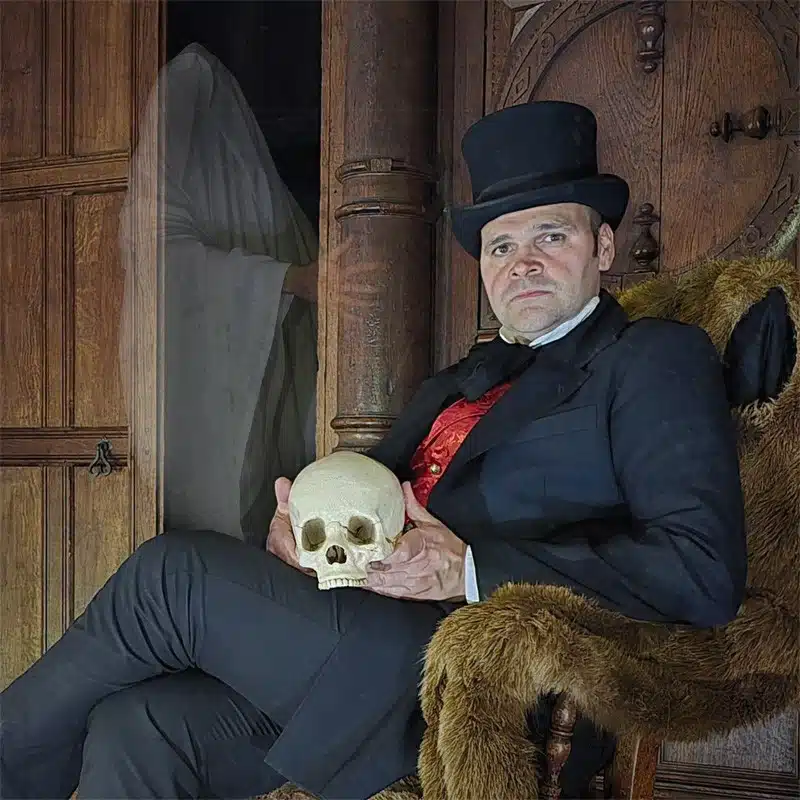
Edwyrdian Tales storyteller Matthew Wood
MATTHEW Wood, Edwyrdian Tales’ purveyor of particularly Victorian/Edwardian gothic, ghostly, spooky horror tales in the flesh and online, presents Ghost Stories for Christmas at York Castle Museum on December 14 from 7pm.
Frances Marshall, who runs historical researchers and performers History Riot, says of Wood: “He’s one of our freelance actors, who started his online storytelling in the 2020 Covid lockdown and now operates his Edwyrdian Tales company.
“He came to Barley Hall last year and this year I encouraged him to try York Castle Museum. His show really is something people will love at this time of year and Matt’s style is brilliant. It’s a bit like M. R. James and indeed uses a lot of his material.”
Edwyrdian Tales’ evening of haunting ghost stories set during Christmastide will feature bone-chilling tales from classic authors of the age, not only by James but by Marjorie Bowen too in a 90-minute performance designed to conjure the spirits of Christmas.
“With the world of Victorian horror to go at, Matt’s round-the-country tours could be a part of his life for many years, so while there’s only one performance in York in 2025, I suspect he will be back,” says Frances.
Edwyrdian Tales in Ghost Stories for Christmas, York Castle Museum, Eye of York, York, December 14, 7pm to 8.30pm. Tickets update: sold out; for returns only, go to: https://www.yorkmuseumstrust.org.uk/whats-on/events/ghost-stories-for-christmas-by-edwyrdian-tales/. Please note: not suitable for children aged under ten; under-18s must be accompanied by an adult.
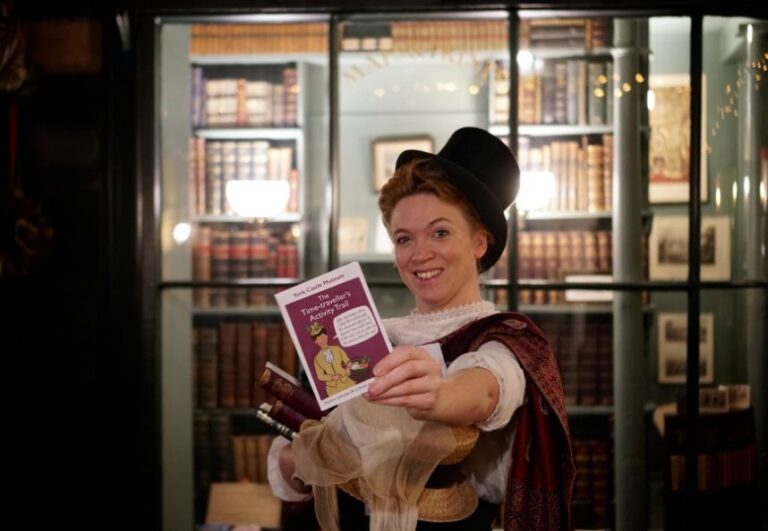
History Riot to lead family-friendly Tales From The Trail at York Castle Museum
HISTORY Riot will return to York Castle Museum daily from December 27 to January 3, except New Year’s Day, with an array of family-friendly Tales From The Trail performances throughout each day.
Join two madcap Victorian characters for an urgent shopping trip on the Victorian street of Kirkgate this festive season. “Prepare for mystery, silliness and stories about the variety of items that they pick up along the way,” says company director Frances Marshall.
Tales From The Trail will run from 10am to 5pm each day at times to be advertised at the admissions desk on the day and will be included in the general admission price to York Castle Museum. To book, go to: https://beta.yorkmuseumstrust.org.uk/york-castle-museum/admission-tickets.
“History Riot’s team consists of historical researchers, musicians, writers, directors, videographers, performers and educators,” says York actress Frances.
“We exist to connect people with the UK’s past, to inspire audiences to feel a fresh sense of identity with the place in which they live and the historical sites they visit.
“Our events are ambitious, accessible and inclusive, pushing the boundaries of historical interpretation while remaining mindful of the sensitive sites we work in.”
Explaining History Riot’s modus operandi, Frances says: “We started as a result of Covid. We’d all worked in the heritage industry for a while – for me it was my ‘muggle job’ when not acting, but I really grew to care a lot about it.
“Basically, we wanted to do history better! And to make it more accessible to everyone, so that it isn’t elitist or somehow removed from the people of the UK in 2025.
“We tell female stories – as unsurprisingly these still aren’t told or taught as much as they should be! – and stories of diverse heritage in Britain, LGBTQ+ history, but often we work these into any story we are telling, rather than one sole focus!”
History Riot work primarily with Historic Royal Palaces (Tower of London, Hampton Court Palace and Kensington Palace) but also with English Heritage.
“We also co-produce with the Old Royal Naval College, amongst many others (see https://www.youtube.com/@HistoryRioters),” Frances continues.
“We hold the contract for schools at Historic Royal Palaces, providing education sessions across three sites from Key Stage 1 all the way up to A-level.
“York is quite new to us, but it’s what I’ve wanted for a long while. We’ve worked with York Museum’s Trust for a couple of years now and most recently on the Viking North exhibition, where we’ve provided live performance worked into the exhibition.
“We’ve found them to be really forward thinking when it comes to what we do and happy to embrace theatre in the midst of heritage.”
Frances concludes: “I would personally love to expand more in York. I’ve been slightly delayed by small child, and then also my own acting career, predominantly the siren call of Alan Ayckbourn at the Stephen Joseph Theatre, Scarborough.
“I do commute down to run our work in the south. But even though heritage is big in York, I think there’s a lot of room for really great professional performance and performers in it!”
Moor Lane Farm Christmas Trees support A Very Yorkshire Christmas at Castle Museum
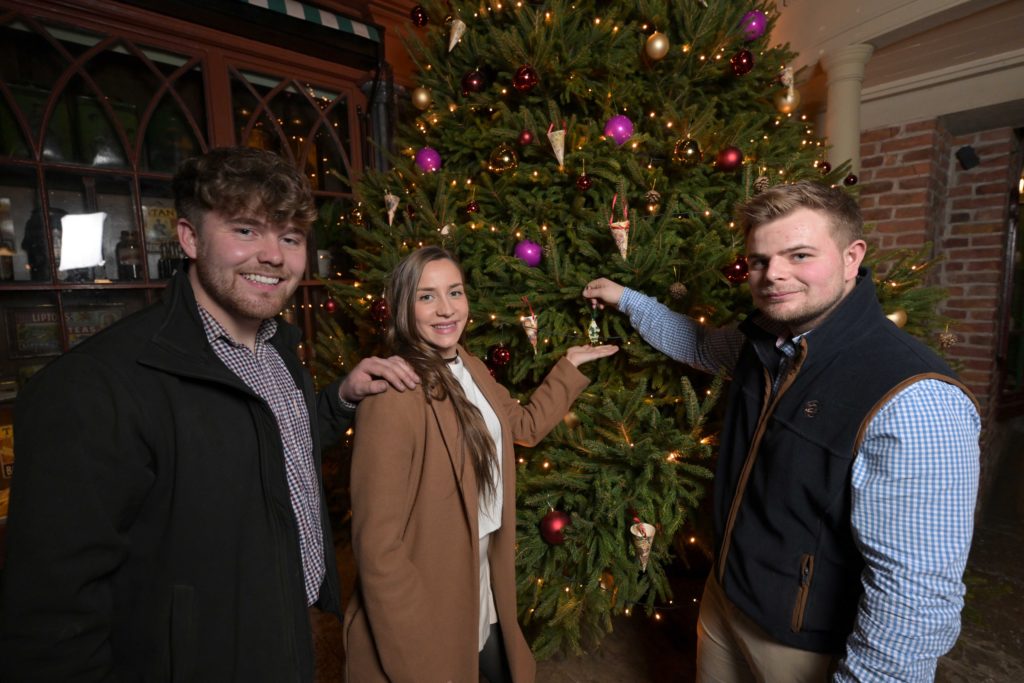
Mikey Arnold, Debbie Tabart and Louis Downes of Moor Lane Farm Christmas Trees
COPMANTHORPE company Moor Lane Farm Christmas Trees are supporting York Museums Trust by supplying the trees for the Christmas display in the Victorian street of Kirkgate at York Castle Museum.
Taking pride of place is the magnificent 16ft Nordman Fir, decorated beautifully with a mixture of baubles and Victorian-inspired paper decorations. The smell of the trees evokes nostalgia and immerses visitors in a Dickensian-style Christmas.
The team at Moor Lane Farm, friends Mikey Arnold, Louis Downes and Debbie Tabart, oversaw the installation of the grand fir tree at ahead of opening on November 15.
This hands-on approach is at the heart of everything they do, with the trio taking on all aspects of the business themselves from organising and selling, to packing and delivery and beyond.
Mikey and agricultural engineer Louis started the business as teenagers in 2017, aged 17 and 15 respectively, “when we couldn’t even drive and each put in £500”, since when the business has grown year on year to provide trees to places such as York Castle Museum, Shambles market, York Theatre Royal, Moxy York hotel and the Fox and Roman pub in Dringhouses, as well as donating trees to St Catherine’s Dementia Care Home in Shipton by Beningbrough.
Carla Starkey, immersive interpretation producer at York Museums Trust, says: “Christmas on Kirkgate has become a much-loved tradition at York Castle Museum, and we are so grateful to have worked with Moor Lane Farm Christmas Trees to create an even more magical experience with the most beautiful fir trees lining the street.
“We cannot thank them enough for their support and were honoured that they were willing to hang the last bauble on the large 16ft tree as part of the installation.”
Mikey, from Moor Lane Farm, says: “We are delighted to support York Castle Museum this year with stunning Christmas trees from our farm. The business has grown over the last nine years from just a few trees to what we hope will be an amazing festive season this year.
“Christmas is something we are all extremely passionate about and we put our all into providing a magical experience for everyone when they are choosing a tree. It’s a privilege to see our hard work paying off and to display our incredible trees in prominent locations in York.”
As a charity, York Museums Trust relies on ticket sales and donations to care for the buildings and collections, but also on the generosity of businesses such as Moor Lane Farm Christmas Trees. Through the support of visitors and York businesses, the trust can continue to provide magical Christmas experiences year after year.
Moor Lane Farm Christmas Trees is open daily for the festive season, from 8.30am to 6.30pm, offering complimentary hot chocolate while you browse for the ideal tree. For more information, visit www.moorlanefarmchristmastreesyork.co.uk.

